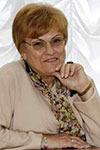
Member of the Russian Academy of Education
President of the Russian Academy of Education,
Moscow, Russia.
President of St. Petersburg State University,
St. Petersburg, Russia.
President of the International Association of Teachers of Russian Language and Literature (MAPRYAL).
-
Cognitive Predictors of Success in Learning Russian Among Native Speakers of High School Age in Different Educational SystemsVerbitskaya, L.A.; Zinchenko, Yu. P. ; Malykh, S. B.; Gaidamashko, Ig.V.; Tikhomirova, T.N.; Kalmyk, O.A.PDF HTML5334“ CITE
Verbitskaya, L.A., Zinchenko, Y.P., Malykh, S.B., Gaidamashko, I.V., Kalmyk, O.A., Tikhomirova, T.N. (2020). Cognitive Predictors of Success in Learning Russian Among Native Speakers of High School Age in Different Educational Systems. Psychology in Russia: State of the Art, 13(2), 2-15.
copied
-
Background. The search for cognitive predictors of success in language learning is associated both with basic cognitive characteristics (processing speed and spatial working memory) and with general characteristics (intelligence). However, the ratio between cognitive functioning and success in language learning can change during the period of school education and depends on the socioeconomic level of the society and the effectiveness of the national educational system.
Objective. To analyze the cognitive predictors of Russian language learning samples of Russian-speaking 11th graders from Russia, Kyrgyzstan, and Moldova, three countries with a similar organization of the educational system, but differing in the functional effectiveness of that educational system and in their socioeconomic levels.
Design. The sample comprised 545 Russian-speaking 11th graders (average age = 17.42 + 0.59; 36.1% male) studying Russian throughout their public-school education in Russia, Kyrgyzstan, and Moldova. The statistical methods of one-way analysis of variance, correlation, and multiple regression analysis were used.
Results. Among the indicators of cognitive development we analyzed, the functioning of the national educational system is the one most associated with the development of fluid intelligence of 11th graders, which is directly proportional to the quality of education in the country; to a lesser extent, it is associated with the development of working memory. In Kyrgyzstan (with an average level of socioeconomic development) and Moldova (with a high level of socioeconomical development), only fluid intelligence was associated with the score on the state exam on the Russian language. In Russia, which has a very high level of socioeconomic development, fluid intelligence and spatial working memory were updated.
Conclusion. Differences in the relationship between cognitive functioning and success in Russian-language learning are associated both with the objectives of the state exam (identification of pupils ready to attend university versus testing of what was learned in school), and, in conditions of low educational effectiveness, with a greater cognitive load during the exam.
DOI: 10.11621/pir.2020.0201
Keywords: processing speed; spatial working memory; fluid intelligence; success in learning Russian; native speakers; state final examination; teacher’s assessment
-
-
Cognitive predictors of success in learning Russian
-
This study examines the role of cognitive characteristics in the success in learning Russian, assessed through teachers’ grades and test scores on standardized state exams.
This paper examines the relationship between cognitive characteristics, such as nonverbal intelligence, working memory and speed of information processing, and the results of the Unified State Exam for 11th grade students, the Basic State Exam for 9th grade students and the traditional assessment of Russian language learning.
This study involved students in the 9th and 11th grades from four educational institutions in the Moscow and St. Petersburg regions; 427 students were studying in the 9th grade (50.3% were boys) and 398 students were studying in the 11th grade (44.8% were boys).
This study concluded that expert assessment of Russian language learning is more associated with successful test scores on the Unified State Exam (r = 0.71, p < 0.01) than with the results of the Basic State Exam (r = 0.46, р < 0.01).
This study showed that at the lower and upper levels of secondary education, nonverbal intelligence is a significant predictor of success in learning the Russian language according to expert estimates. In addition, we found differences in the relationship between cognitive performance and success in learning the Russian language as assessed by tests. Nonverbal intelligence contributes significantly to individual differences in scores for the Unified State Exam in Russian, while the contribution of cognitive characteristics on the Basic State Exam is not statistically significant.
DOI: 10.11621/pir.2015.0408
Keywords: nonverbal intelligence, cognitive characteristics, success in learning Russian, Unified State Exam, State Final Examination, annual assessment
-









